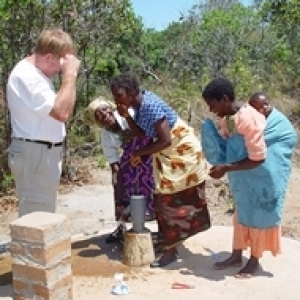Climate Smart Agriculture
18th March 2018:
The picture shows a maize crop on the worst soil imaginable. Local Maize seed, No inorganic fertilizer and no noxious chemical.
Doesn't look much but there is magic happening here.
Climate change is an issue for all of us, whether we are believers in Global warming or not. The global climate is changing and if I lived in Bangladesh where people are poor or in Miami, I would think of moving, if I could afford to.
Every move we make, every breathe we take releases CO2 into the atmosphere. We are a danger to the planet as we want to take, take, take. There are too many of us taking more and more. The wealthier we are the more CO2 we deliver to the atmosphere from cars, flights, food and energy waste and even our cappuccinos.
Without (too much) doubt the level of carbon dioxide in the earth’s atmosphere has doubled in the past 60 years and now has put an extra blanket around us to keep us cosy. Global Warming is a consequence.
There are two main schools of thought: Keep going as we are and science will eventually intervene, or do something NOW. I favour the latter.
We could build massive CO2 collectors and sequester CO2 in many ways, like planting billions of trees. We could unilaterally stop using fossil fuels or we could give up cars and technology and live like the Amish. All such actions are almost certainly not going to happen.
But 400ppm of CO2 in the atmosphere, is serious.
Strangely enough , the developing world might be able to help out. I work in Malawi, as Wells for Zoe, since 2005 where we mainly manufacture and install pumps for over half a million of the poorest.
But having been born a farmer in the West of Ireland, I have taken an interest in agriculture and couldn’t believe that such a poor country were using a combination of GM seeds and inorganic fertilizer, so in 2006 we bought a piece of land and began what we called organic farming, that I had seen my grandfather Tom Coll doing in the early fifties. He grew his cabbage and saved his seed and there was no buying as the cow and the pig gave you manure.
So I searched the world for open pollinated seeds from Gorthahork cabbage to heirloom, pest resistant tomato from Wyoming.
I learned about green manure plants and others for pest control. We bought some chicken, cow and pig manure. We made compost and liquid manure.
For a while we called it organic farming, sustainable farming, then Agroforestry and now we call it Climate Smart Agriculture, CSA.
Our all Malawian team grow vegetables and fruit, while researching and training others.
This year we produced over 40,000 fruit tree seedlings using budding and grafting, but that’s another story
Around 2009, I discovered a plant called Tephrosia Vogellii. I found that it could be used for killing pests, like caterpillars in our cabbage. We put the leaves in water and pounded them, let them soak and sprayed. We still do that with a little more sophistication like adding boiling water and a little soap solution.
Then we found that this plant fixes nitrogen in the soil, that it kills weevils in maize storage it kills stalk borers and now it halts one of the most destructive pests in Maize, armyworms
Now we use in what might be termed CSA. We go slightly beyond the general term in that we use minimum till and no inorganic fertilizer.
Carbon sequestration, a process whereby trees absorb CO2 form the atmosphere, so we felt that maybe is well advanced as we have just begun a project targeting the planting of 2 million trees.
Along with regular trees we have been working on nitrogen fixing trees and shrubs to do the same job but maybe better in that it has root storage capabilities.
There are so many studies advocating the soil as a place to store carbon.
So our CSA improves the soil structure and stores carbon at the same time as we fix nitrogen, retain water, keep the microbes out of the sun and prevent the growth of weeds and do our little bit to save the planet.
A combination of Forestry Planting and CSA might become a winning team, if we can convince others, but that’s the hard bit.
- 3
- 2

Comments
Sign in or get an account to comment.


